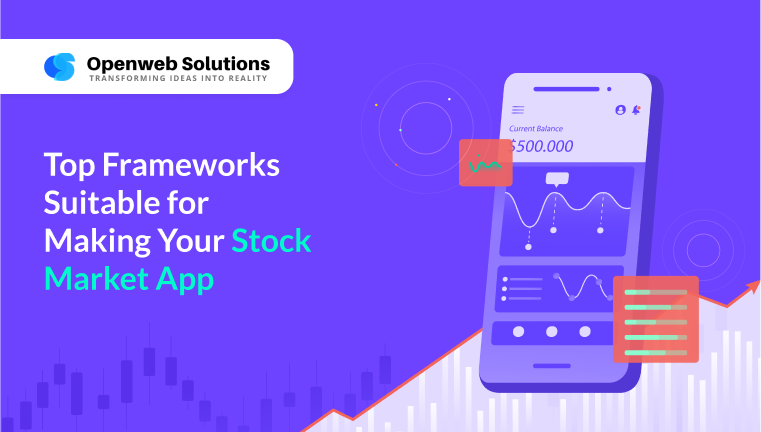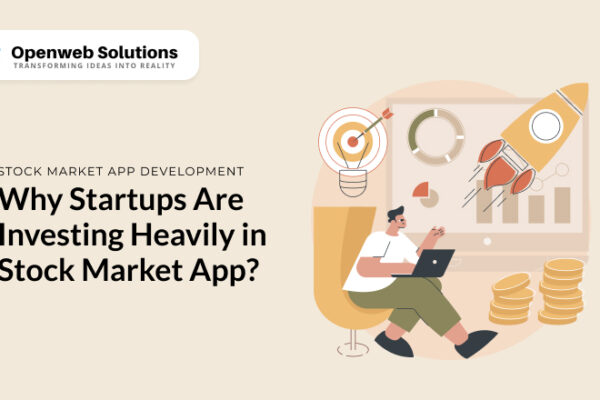The stock market is more accessible than ever before. Thanks to the proliferation of mobile apps and websites catering to traders and investors. These platforms have revolutionized how people engage with the stock market, offering real-time data, analysis tools, and seamless trading experiences. Behind the scenes, however, lie robust frameworks that power these stock market applications, ensuring reliability, security, and scalability. In this blog post, we’ll delve into some of the top frameworks for developing stock market apps, paving the way for efficient and feature-rich solutions.
Common Frameworks Used for Developing Stock Market Apps
1. React Native
As the demand for cross-platform mobile apps continues to soar, React Native emerges as a top choice for Stock Market Software Development. Leveraging the power of JavaScript, React Native allows developers to build high-performance apps that run smoothly on both iOS and Android platforms. Its component-based architecture facilitates code reusability and accelerates the development process, making it an ideal framework for creating feature-packed stock market apps. By harnessing the capabilities of React Native, developers can ensure a seamless user experience, real-time updates, and intuitive interfaces, thereby enhancing user engagement and retention.
2. Angular
Angular, developed and maintained by Google, is another popular framework widely used in Stock Market App Development. With its comprehensive toolkit and MVC architecture, Angular empowers developers to build dynamic, interactive, and data-driven applications for the stock market industry. Its robust features, such as two-way data binding, dependency injection, and modular development, streamline the development workflow and promote code maintainability. Whether it’s crafting real-time stock charts, implementing complex financial calculations, or integrating third-party APIs, Angular provides the tools and flexibility needed to create sophisticated stock market apps tailored to the specific needs of traders and investors.
3. Django
When it comes to Stock Market Website Development, Django stands out as a versatile and efficient framework for building web applications with Python. Known for its simplicity, scalability, and security, Django offers a comprehensive set of features and libraries that streamline the development process and ensure the rapid deployment of stock market websites. With Django’s built-in admin interface, developers can effortlessly manage financial data, user accounts, and content, while its robust security features help safeguard sensitive information and protect against cyber threats. By harnessing the power of Django, developers can create responsive, data-driven stock market websites that deliver real-time updates, insightful analysis, and seamless trading experiences to users worldwide.
4. Node.js
Node.js, with its event-driven architecture and non-blocking I/O model, has become a preferred choice for developing scalable and real-time stock market applications. By leveraging JavaScript both on the client and server side, Node.js enables developers to build high-performance trading platforms that can handle a large volume of concurrent connections and deliver lightning-fast responses. Its rich ecosystem of modules and libraries, combined with its asynchronous nature, makes it well-suited for implementing features such as live market data feeds, push notifications, and interactive charts. Whether it’s building a trading platform, portfolio tracker, or financial analytics tool, Node.js provides the flexibility and performance required to meet the demands of today’s dynamic stock market landscape.
Winding up
The development of stock market apps relies heavily on robust frameworks that provide the foundation for building scalable, secure, and feature-rich solutions. Whether it’s React Native for cross-platform mobile apps, Angular for dynamic web applications, Django for comprehensive stock market websites, or Node.js for real-time trading platforms, each framework offers unique advantages that cater to the diverse needs of traders, investors, and financial institutions. By leveraging these frameworks effectively, businesses can accelerate their Stock Market App Development initiatives, drive user engagement, and stay ahead of the competition in this rapidly evolving industry.
The FAQ’s
FAQ’s for Stock Market App Development:
FAQ 1. What are the advantages of using React Native for developing stock market apps?
Answer: React Native offers several advantages for stock market app development, including cross-platform compatibility, allowing developers to create apps that run smoothly on both iOS and Android. Its component-based architecture facilitates code reusability and accelerates development, leading to a seamless user experience with real-time updates and intuitive interfaces.
FAQ 2. Why is Angular a popular choice for stock market app development?
Answer: Angular, developed by Google, is favoured for its comprehensive toolkit and MVC architecture. It enables developers to build dynamic, interactive, and data-driven applications, ideal for implementing features such as real-time stock charts, financial calculations, and third-party API integration. Angular streamlines development workflow and promotes code maintainability, essential for sophisticated stock market apps.
FAQ 3. How does Django contribute to stock market website development?
Answer: Django, a Python-based framework, offers simplicity, scalability, and security, making it ideal for building responsive, data-driven stock market websites. With its built-in admin interface and robust security features, Django facilitates the rapid deployment of websites that deliver real-time updates, insightful analysis, and seamless trading experiences to users worldwide.
FAQ 4. What makes Node.js a preferred choice for real-time stock market applications?
Answer: Node.js, known for its event-driven architecture and non-blocking I/O model, is preferred for developing scalable and real-time stock market applications. Leveraging JavaScript on both the client and server side, Node.js enables high-performance trading platforms capable of handling large volumes of concurrent connections and delivering lightning-fast responses, crucial for live market data feeds and interactive charts.
FAQ 5. How do these frameworks contribute to staying competitive in the stock market industry?
Answer: Leveraging frameworks like React Native, Angular, Django, and Node.js enables businesses to accelerate stock market app development initiatives, drive user engagement, and stay ahead of the competition. These frameworks provide the foundation for building scalable, secure, and feature-rich solutions tailored to the diverse needs of traders, investors, and financial institutions, ensuring competitiveness in the rapidly evolving stock market landscape.
Partha Ghosh is the Digital Marketing Strategist and Team Lead at PiTangent Analytics and Technology Solutions. He partners with product and sales to grow organic demand and brand trust. A 3X Salesforce certified Marketing Cloud Administrator and Pardot Specialist, Partha is an automation expert who turns strategy into simple repeatable programs. His focus areas include thought leadership, team management, branding, project management, and data-driven marketing. For strategic discussions on go-to-market, automation at scale, and organic growth, connect with Partha on LinkedIn.





